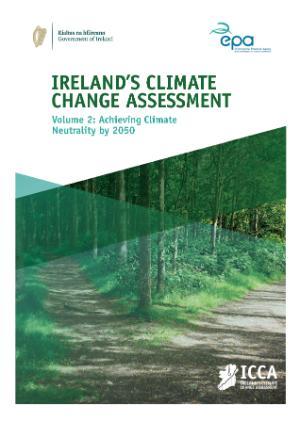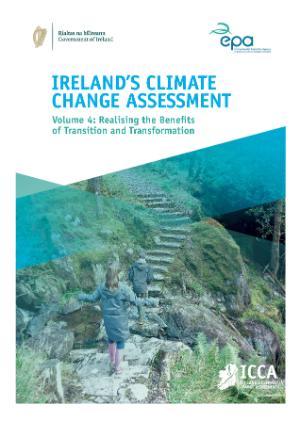
Ireland’s Climate Change Assessment Report
Ireland’s Climate Change Assessment (ICCA) for the first time provides a comprehensive and authoritative assessment of the state of knowledge around all key aspects of climate change, with a central focus on Ireland. The objective of Ireland’s Climate Change Assessment (ICCA) is the following:
- To deliver a comprehensive report on our understanding of climate change.
- The option to respond to the challenges it poses.
- To identify opportunities that may arise from the planned transition to a climate neutral, biodiversity-rich, environmentally sustainable and climate resilient economy and society.
MaREI researchers at University College Cork (UCC) were involved in writing ‘Volume 2 – Achieving climate neutrality by 2050‘ and ‘Volume 4 – Realising the benefits of transition and transformation‘.
The report provides an assessment of our understanding of climate change, tying together all available lines of evidence to provide actionable information. This is based on scientific research and systematic observations in Ireland, linked to EU and global analysis. ICCA aims to provide summary information that can inform decision-making on climate actions.
The ICCA report is provided in four volumes. Each volume includes a short Summary for Policymakers. Accompanying the four volumes is a Synthesis Report which integrates key findings across the underlying volumes and provides an accessible overall summary.
The EPA today published Ireland’s first Climate Change Assessment Report. This is the first comprehensive and authoritative assessment of the state of knowledge of climate change in Ireland. https://t.co/mUEmhoihdV#IrelandsClimateChangeAssessment #IrelandsClimate #ICCA pic.twitter.com/XhsNm6yeTs
— EPA Ireland (@EPAIreland) January 25, 2024

Volume 2 – Achieving climate neutrality by 2050
Volume 2 aims to address achieving climate neutrality by 2050 by investigating and assessing three key areas: mitigation pathways, and what form reducing emissions over time may take; assessing the factors that may constitute and result in a climate neutral society, including energy use, land use and the emissions landscape; and finally, assessing the enablers that may make change possible by building on societal dimensions and investigating policy implications.
Authors include MaREI’s Dr Abhay Menon, Professor Brian Ó Gallachóir, Dr Paul Deane and MaREI alumni Dr Connor McGookin and Dr. Shane McDonagh.

Volume 4 – Realising the benefits of transition and transformation
Volume 4 highlights the benefits, opportunities and synergies that can be achieved through transformation, and how they can be realised. This volume is a state-of-the-knowledge assessment that draws on global synthesis literature, including the IPCC and the Intergovernmental Science-Policy Platform on Biodiversity and Ecosystem Services (IPBES), international peer-reviewed and grey literature to identify key characteristics of transformative change. It explores the emergence of these characteristics in the national context. Knowledge gaps are highlighted to inform and enhance research related to transformations in Ireland. This volume aims to aid national policy discussions toward enabling, catalysing and achieving transformative change and associated benefits.
Authors include MaREI’s Dr Róisín Moriarty and Professor Hannah Daly.






